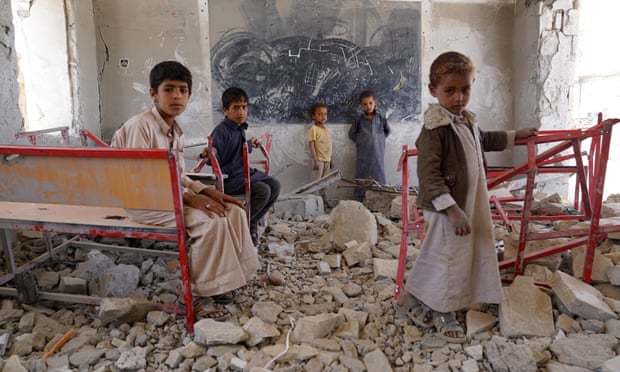Campaigners urge world leaders to keep global education targets on track after figures reveal education receives same level of aid funding as transport
Campaigners who believe funding for schooling in the world’s poorest countries has hit crisis levels say next month’s G20 meeting will be a “make or break” moment for education.
The share of aid funding spent on education has fallen for the past six years, from 10% in 2009 to 6.9% in 2015, according to new figures from the UN Educational, Scientific and Cultural Organization (Unesco). Education now receives as little in aid funding as transport.
Campaigners said that if world leaders fail to take action when they meet at the G20 summit in Hamburg in July, there is little possibility of meeting the education targets set out in the sustainable development goals. These call for every child to receive a full primary and secondary education by 2030.
“Education has been neglected by world leaders and international institutions for too long,” said Barry Johnston, associate director of advocacy at the Malala Fund. “There’s a movement in the coming weeks to get G20 leaders to recognise that there’s a problem, there’s a crisis in financing, and acknowledge that if they want to have healthy societies in the future – if they want to have an educated workforce that can meet the challenges of the future – then they’re going to have to start paying to get kids into school. And not just into school, but learning the right stuff.”
The Education Commission, chaired by Gordon Brown, the former British prime minister, estimates global spending on education must increase from $1.2tn (£931bn) a year today to $3tn by 2030 across all low- and middle-income countries.
Justin van Fleet, director of the International Commission on Financing Global Education Opportunity, said the G20 meeting could be a turning point.
“One of the things we’re asking donor countries to think about doing is to prioritise education to the same level as health, to make education 15% of their overseas development assistance, and to channel more of that money towards multilateral funds,” said Fleet.
There are calls to establish a financing scheme – which would bring together public and private donors, alongside international financial institutions such as the World Bank and regional development banks – to raise additional funding. Such a body could increase education financing by more than $10bn annually by 2020.
In addition, campaigners say $3.85bn is needed by 2021 to fund Education Cannot Wait, a programme that supports schooling in emergencies. They also believe financing for the Global Partnership for Education, which provides grants to support the education systems in countries with the greatest need, should increase to $2bn a year by 2020.
Work is needed in some of the world’s poorest countries to make sure a greater proportion of the national budget is spent on education, and that it is being spent effectively, added Johnston. Reform to global and international tax rules will be required to ensure the least developed countries have more money to spend on education funding, he said.
Irina Bokova, director general of Unesco, said aid also needs to be better targeted. Unesco data shows that sub-Saharan Africa, home to more than half of the world’s out-of-school children, now receives less than half the aid for basic education it obtained in 2002. This amounts to 26% of total aid to basic education – little more than the 22% allocated to northern Africa and western Asia, where 9% of children are out of school.
The Education Commission has warned that unless governments increase investment and target need more effectively, the world is on course to deny half of its young people an education.
“The projection for 2030 is there’ll be 1.6 billion young people in the world, and we’re on track to leave behind half of this generation,” said Fleet. “So 825 million young people, if we continue to invest in the way we are, will not have gone to school or they’ll have dropped out, and they won’t have the skills to be employable.”
Securing commitments from donor countries is a challenge partly because the benefits are not immediately visible. “That’s the difference with health sector – if someone asks for £5m for vaccines, at £1 per vaccine, you can then point to 5 million children who are still alive,” said Johnston. The benefits of making the same investment in schools take decades to emerge.
Manos Antoninis, senior policy analyst at the global education monitoring report, said aid has increased considerably worldwide since 2010. “Despite the financial crisis, it has increased by 24% between 2010 and 2015 – but in education it is still below the 2010 levels. So the reason is not that there’s no aid flowing from rich countries, it is that it’s not receiving a priority.”
In 2015, the US and the UK remained the two largest donors to basic education – which includes support to pre-primary and primary education as well as adult education and literacy programmes – though they reduced their allocations by 11% and 9% respectively between 2014-2015.



Nenhum comentário:
Postar um comentário